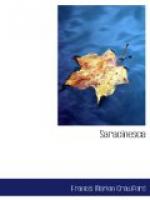The Sister was silent, and looked away.
“No—of course you cannot tell me,” continued Corona; “but it is such a wonderful thing. It makes days seem like hundreds of years, or makes them pass in a flash of light, in a second. It oversets every idea of time, and plays with one’s resolutions as the wind with a feather. If once it gets the mastery of one, it crowds a lifetime of pain and pleasure into one day; it never leaves one for a moment. I cannot explain love—it is a wonderful thing.”
“My dear friend,” said the Sister, “the explanation of love is life.”
“But the end of it is not death. It cannot be,” continued Corona, earnestly. “It must last for ever and ever. It must grow better and purer and stronger, until it is perfect in heaven at last: but where is the use of trying to express such things?”
“I think it is enough to feel them,” said Sister Gabrielle.
CHAPTER XXVI.
The summer season ripened into autumn, and autumn again turned to winter, and Rome was once more full. The talk of society turned frequently upon the probability of the match between the Duchessa d’Astrardente and Giovanni Saracinesca; and when at last, three weeks before Lent, the engagement was made known, there was a general murmur of approbation. It seemed as though the momentous question of Corona’s life, which had for years agitated the gossips, were at last to be settled: every one had been accustomed to regard her marriage with old Astrardente as a temporary affair, seeing that he certainly could not live long, and speculation in regard to her future had been nearly as common during his lifetime as it was after his death. One of the duties most congenial to society, and one which it never fails to perform conscientiously, is that judicial astrology, whereby it forecasts the issue of its neighbour’s doings. Everybody’s social horoscope must be cast by the circle of five-o’clock-tea-drinking astro-sociologists, and, generally speaking, their predictions are not far short of the truth, for society knoweth its own bitterness, and is uncommonly quick in the diagnosis of its own state of health.
When it was announced that Corona was to marry Giovanni after Easter, society looked and saw that the arrangement was good. There was not one dissenting voice heard in the universal applause. Corona had behaved with exemplary decency during the year of her mourning—had lived a life of religious retirement upon her estates in the sole company of a Sister of Charity, had given no cause for scandal in any way. Everybody aspired to like her—that is to say, to be noticed by her; but with one exception, she had caused no jealousy nor ill-feeling by her indifference, for no one had ever heard her say an unkind word concerning anybody she knew. Donna Tullia had her own reasons for hating Corona, and perhaps the world suspected them; but people did not connect the noisy Donna Tullia, full of animal spirits and gay silly talk, with the idea of serious hatred, much less with the execution of any scheme of revenge.




